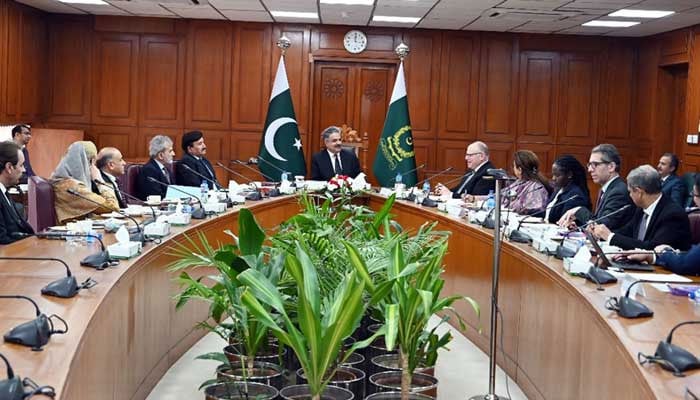IMF visit
Fund called on CJP Afridi, who provided overview about ongoing efforts to enhance judicial performance
The start of this week brought yet another visit from the IMF. But unlike previous visits, this latest one is not about market reforms, taxes and budgets and checking up on how the country is keeping up with IMF conditions -- at least not directly. Rather, the focus is on an issue Pakistanis are much more familiar with: governance and corruption. According to an official statement issued by the finance ministry on Sunday, a three-member IMF scoping mission is visiting Pakistan to undertake a Governance and Corruption Diagnostic Assessment (GCDA). The focus of the mission will reportedly be to examine the severity of corruption vulnerabilities across six core state functions, including fiscal governance, central bank governance and operations, financial sector oversight, market regulation, rule of law and Anti-Money Laundering and Combating the Financing of Terrorism (AML-CFT). The GDCA report is expected to recommend actions, which will assist the government in bringing about reforms that promote transparency, strengthen institutional capacities and help achieve inclusive and sustainable economic growth. While governance and corruption are considered to be outside of the IMF’s main focuses, which is centred on promoting market reforms, correcting fiscal imbalances and countering inflation, the Fund has realised over the years that attaining these economic goals often requires a much broader set of changes that address rule of law, corruption and transparency and accountability in the public sector.
As such, the current IMF visit will involve meetings with the Election Commission of Pakistan (ECP) and the Ministry of Law & Justice, aside from the more traditional economic institutions. On Tuesday, the Fund called on Chief Justice of Pakistan Yahya Afridi, who provided an overview about the ongoing efforts to enhance judicial performance. The Fund was also briefed on judicial reforms and the National Judicial Policy and reportedly provided suggestions regarding the protection of property rights, emphasising the need for foreign investment protection in Pakistan. While the IMF delegation has reportedly acknowledged the judiciary’s role in maintaining legal and institutional stability and expressed its appreciation for ongoing reforms, its final analysis of rule of law and governance in general remains to be seen.
All this being said, the main dynamic of Pakistan’s relationship with the IMF remains an economic one. In particular, the focus is on getting the state to balance its books while still supporting inclusive and sustainable growth. In this regard, the current IMF visit has also reportedly brought signals of some much-needed flexibility on the country’s power tariffs. Prime Minister Shehbaz Sharif on Wednesday said the Fund will duly consider a proposed reduction in electricity prices, raising hopes for financial relief among consumers who have been battered by high prices. And while corruption and governance remain significant challenges for Pakistan and the IMF seeking to provide assistance on this front might be helpful, there has to be some acknowledgement about how these problems are rooted in poverty and an exploitative global financial system that gives developing countries the short end of the stick. Citizens struggling to bear the weight of inflated power bills will not have much money to give the state to strengthen public governance and improve rule of law. This is also an environment in which activities like electricity theft and the associated corruption will thrive. A market that does not meet the needs of the citizenry will be one in which most people do not want to participate, leading them to cut corners when it comes to taxes and tariffs. With this in mind, it is crucial to ensure that what reforms the IMF does seek to implement do actually deliver tangible benefits to the people rather than just making their lives harder.
-
 Jesy Nelson Reflects On Leaving Girls' Band Little Mix
Jesy Nelson Reflects On Leaving Girls' Band Little Mix -
 World’s First Pokemon Theme Park Opens In Tokyo, Boosts Japan Tourism
World’s First Pokemon Theme Park Opens In Tokyo, Boosts Japan Tourism -
 Waymo Trains Robotaxis In Virtual Cities Using DeepMind’s Genie 3
Waymo Trains Robotaxis In Virtual Cities Using DeepMind’s Genie 3 -
 5 Simple Rules To Follow For Smooth, Healthy Hair
5 Simple Rules To Follow For Smooth, Healthy Hair -
 $44 Billion Bitcoin Blunder: Bithumb Exchange Apologizes For Accidental Payout
$44 Billion Bitcoin Blunder: Bithumb Exchange Apologizes For Accidental Payout -
 Katie Price Ends Public Feud With Ex Peter Andre After 16 Years
Katie Price Ends Public Feud With Ex Peter Andre After 16 Years -
 Apple May Bring ChatGPT And Other AI Apps To CarPlay
Apple May Bring ChatGPT And Other AI Apps To CarPlay -
 Meghan Markle, Prince Harry Likely To Attend Super Bowl Halftime Show 2026
Meghan Markle, Prince Harry Likely To Attend Super Bowl Halftime Show 2026 -
 AI Next Big Trial: Elon Musk Calls For ‘Galileo Test’ To Prove True Intelligence
AI Next Big Trial: Elon Musk Calls For ‘Galileo Test’ To Prove True Intelligence -
 US Appeals Court Affirms Trump’s Immigration Detention Policy
US Appeals Court Affirms Trump’s Immigration Detention Policy -
 Bella Hadid, Adan Banuelos Rekindle Romance After Brief Separation
Bella Hadid, Adan Banuelos Rekindle Romance After Brief Separation -
 Jay-Z Shares Bold Advice With Bad Bunny For NFL Super Bowl Halftime Show Appearance
Jay-Z Shares Bold Advice With Bad Bunny For NFL Super Bowl Halftime Show Appearance -
 Epstein Probe: Bill, Hillary Clinton Call For Public Testimony Hearing
Epstein Probe: Bill, Hillary Clinton Call For Public Testimony Hearing -
 Brooklyn Beckham Considers Adoption As Nicola Peltz Can't Carry A Baby
Brooklyn Beckham Considers Adoption As Nicola Peltz Can't Carry A Baby -
 Expert Discusses 'complications' Of Measles Outbreak
Expert Discusses 'complications' Of Measles Outbreak -
 Kaley Cuoco Recalls Her Divorce With Karl Cook: 'I Was Gonna Die'
Kaley Cuoco Recalls Her Divorce With Karl Cook: 'I Was Gonna Die'




